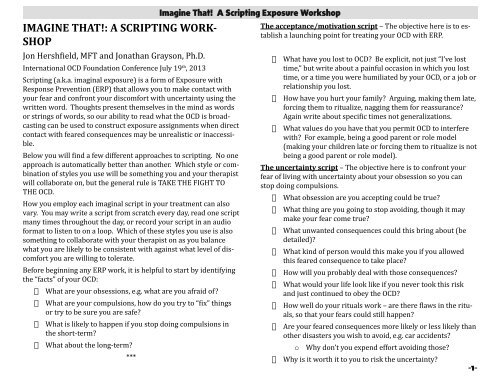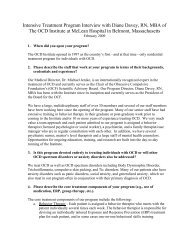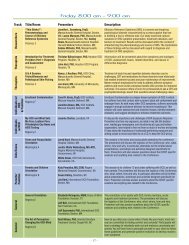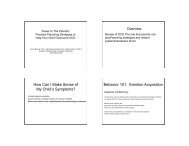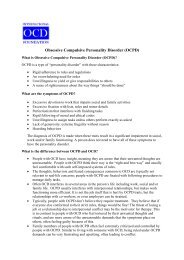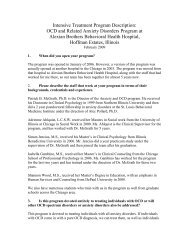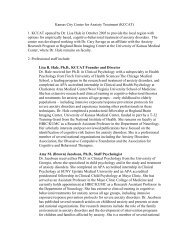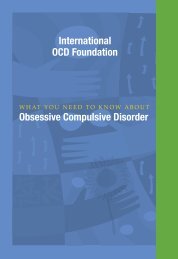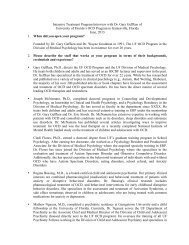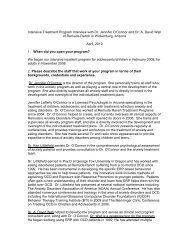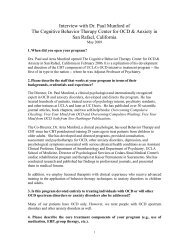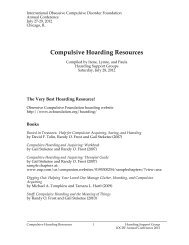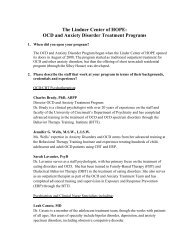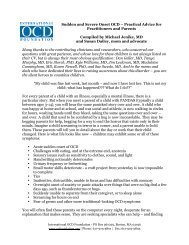perfectionism and - Obsessive-Compulsive Foundation
perfectionism and - Obsessive-Compulsive Foundation
perfectionism and - Obsessive-Compulsive Foundation
Create successful ePaper yourself
Turn your PDF publications into a flip-book with our unique Google optimized e-Paper software.
IMAGINE THAT!: A SCRIPTING WORK-<br />
SHOP<br />
Jon Hershfield, MFT <strong>and</strong> Jonathan Grayson, Ph.D.<br />
International OCD <strong>Foundation</strong> Conference July 19 th , 2013<br />
Scripting (a.k.a. imaginal exposure) is a form of Exposure with<br />
Response Prevention (ERP) that allows you to make contact with<br />
your fear <strong>and</strong> confront your discomfort with uncertainty using the<br />
written word. Thoughts present themselves in the mind as words<br />
or strings of words, so our ability to read what the OCD is broadcasting<br />
can be used to construct exposure assignments when direct<br />
contact with feared consequences may be unrealistic or inaccessible.<br />
Below you will find a few different approaches to scripting. No one<br />
approach is automatically better than another. Which style or combination<br />
of styles you use will be something you <strong>and</strong> your therapist<br />
will collaborate on, but the general rule is TAKE THE FIGHT TO<br />
THE OCD.<br />
How you employ each imaginal script in your treatment can also<br />
vary. You may write a script from scratch every day, read one script<br />
many times throughout the day, or record your script in an audio<br />
format to listen to on a loop. Which of these styles you use is also<br />
something to collaborate with your therapist on as you balance<br />
what you are likely to be consistent with against what level of discomfort<br />
you are willing to tolerate.<br />
Before beginning any ERP work, it is helpful to start by identifying<br />
the “facts” of your OCD:<br />
· What are your obsessions, e.g. what are you afraid of<br />
· What are your compulsions, how do you try to “fix” things<br />
or try to be sure you are safe<br />
· What is likely to happen if you stop doing compulsions in<br />
the short-term<br />
· What about the long-term<br />
***<br />
Imagine That! A Scripting Exposure Workshop<br />
The acceptance/motivation script – The objective here is to establish<br />
a launching point for treating your OCD with ERP.<br />
· What have you lost to OCD Be explicit, not just “I’ve lost<br />
time,” but write about a painful occasion in which you lost<br />
time, or a time you were humiliated by your OCD, or a job or<br />
relationship you lost.<br />
· How have you hurt your family Arguing, making them late,<br />
forcing them to ritualize, nagging them for reassurance<br />
Again write about specific times not generalizations.<br />
· What values do you have that you permit OCD to interfere<br />
with For example, being a good parent or role model<br />
(making your children late or forcing them to ritualize is not<br />
being a good parent or role model).<br />
The uncertainty script – The objective here is to confront your<br />
fear of living with uncertainty about your obsession so you can<br />
stop doing compulsions.<br />
· What obsession are you accepting could be true<br />
· What thing are you going to stop avoiding, though it may<br />
make your fear come true<br />
· What unwanted consequences could this bring about (be<br />
detailed)<br />
· What kind of person would this make you if you allowed<br />
this feared consequence to take place<br />
· How will you probably deal with those consequences<br />
· What would your life look like if you never took this risk<br />
<strong>and</strong> just continued to obey the OCD<br />
· How well do your rituals work – are there flaws in the rituals,<br />
so that your fears could still happen<br />
· Are your feared consequences more likely or less likely than<br />
other disasters you wish to avoid, e.g. car accidents<br />
o Why don’t you expend effort avoiding those<br />
· Why is it worth it to you to risk the uncertainty<br />
-1-


